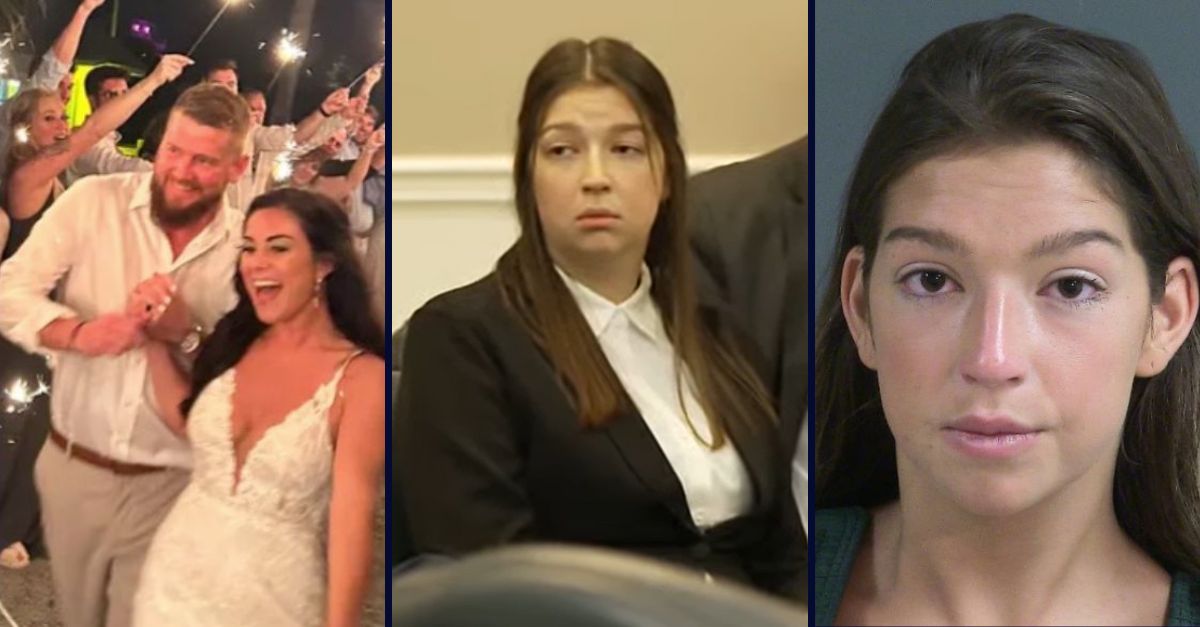
On April 28, 2023, Aric Hutchinson and Samantha Miller tied the knot, as shown in a photo from their GoFundMe page. Shortly after, Jamie Lee Komoroski was captured in a photo waiting for sentencing on December 2, 2024, following a guilty plea, as reported by Law&Crime. Another picture on the right shows Jamie Lee Komoroski in an image from the Charleston County Sheriff’s Office.
The drunk driver who killed a newlywed bride moments after her wedding reception last year is asking a judge to reduce her prison sentence.
In a 77-page filing submitted on Thursday, attorneys for Jamie Lee Komoroski, 26, asked Ninth Judicial Circuit Judge Deadra L. Jefferson to reconsider the condemned woman’s 25-year sentence.
On Dec. 2, Komoroski pleaded guilty to two counts of felony DUI resulting in great bodily injury and one count each of felony DUI resulting in death and reckless homicide resulting in death.
Sentencing happened apace in the Palmetto State. That same day, the court sentenced her to 15 years for each DUI, resulting in injury convictions, 25 years for the DUI resulting in death conviction, and 10 years for the reckless homicide conviction. Jefferson assessed the sentences to run concurrently — or at the same time — as one another.
In the motion, the defense says her upcoming prison stint is “unwarranted and grossly disproportionate” for similarly situated cases in the Lowcountry region of South Carolina — and even when compared to many other “neighboring jurisdictions” across vast swathes of the southern and Mid-Atlantic regions of the country.
A canvass of sentences in the same court for felony DUI resulting in death shows sentences ranging from nine to 18 years behind bars.
In a review of such cases from broader Charleston County, including some cases involving multiple deaths, the defense showed how some cases resulted in sentences of as few as six years behind bars.
Yet other Charleston County cases show some sentences technically disposed of with exactly the same sentence as Komoroski — 25 years — but only on paper. In those cases, however, the ultimate prison time served was only 16 years because the full sentence was suspended by several years. In still other similar cases cited by the defense, ultimate time served ranged from as little as four to as much as 18 years behind bars, according to the motion.
And, in many South Carolina cases from different counties with similar facts, the defense notes, defendants have received effective sentences of as little as three years in prison.
On the night in question, Komoroski was behind the wheel and severely intoxicated when she struck the golf cart carrying the celebratory couple as they left their wedding reception in Folly Beach. The crash killed Samantha Miller, 34, and injured her husband, Aric Hutchinson, as well as his brother-in-law and nephew.
According to the South Carolina Law Enforcement Division, the drunk driver was traveling 65 mph at the time of impact in the largely residential area, which has a speed limit of 25 mph.
Komoroski allegedly refused a field sobriety test and reeked of alcohol, telling law enforcement that she only had one beer and a drink with tequila about an hour before the crash, police wrote in an affidavit. According to at least one witness on the scene, the defendant repeatedly said she “did nothing wrong.”
When she refused to take a field sobriety test and give a breath sample, police obtained a warrant to draw blood. Tests showed a blood alcohol content of .261, more than three times the legal limit.
The motion’s laundry list reads:
Lack of any criminal history or any history of violence;
Unprotected pleas of guilty to spare the victim-family members from the difficulty of trial and save the State time and resources;
Absence of intent to cause death;
known struggles with alcohol abuse, and remedial steps taken to address her addiction;
genuine expressions of remorse and regret for her actions;
History, character and rehabilitative potential;
No prior history of DUI or DUI-related offenses; and
Complete and unequivocal acceptance of responsibility for her actions.
“The Court is required to equally consider both aggravating and mitigating factors and, as evidenced by the maximum sentence issued against Ms. Komoroski on each count to which she pleaded, such balancing did not occur,” the filing argues.
The convicted woman’s attorneys point out that in many of the surveyed cases — where similarly-situated defendants received lesser sentences than their client — the mitigating factors were less voluminous. Often, repeat DUI offenders were sentenced more leniently than Komoroski, who “received the most severe penalty permitted by state law for each count to which she pleaded guilty.”
And in some cases, the defense points out, vastly lower sentences have been meted out to defendants who killed multiple victims, who had a BAC higher than or comparable to Komoroski, and who contested their charges and lost at trial.
The motion suggests media coverage is a key — and improper — factor to blame for the “gross disproportionality” of sentencing.
“Unlike Ms. Komoroski, all similarly charged defendants received some type of sentence credit for pleading guilty, saving the State and victim- family members from the emotional difficulty and trauma of a contested jury trial,” the motion reads. “These other cases likely did not garner the same degree of media attention; however, the significant media interest cannot serve as an aggravating factor justifying a longer sentence.”
The defense also notes sentencing ranges in “neighboring” states as varied as Alabama, North Carolina, Georgia, Florida, Kentucky, Maryland, Texas, West Virginia, and Virginia. In none of those states does sentencing surpass 20 years for drunk-driving causing death.








